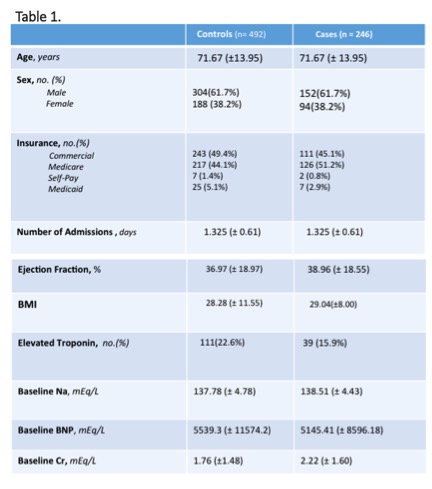Session Information
Session Type: Poster Session B
Session Time: 9:00AM-11:00AM
Background/Purpose: There is growing evidence that both the prevalence of gout and its burden on healthcare costs has increased over recent decades. It has been shown that hospitalization increases the risk of acute gout flare, which may prolong hospital stay compared to those without gout flare. It is unclear whether patients with history of gout would have longer hospital stays in general, or only when they have a flare. The objective of this study is to examine the effect of gout diagnosis and flare on the length of stay in patients admitted for heart failure exacerbation in a health care system.
Methods: We conducted a case control study using electronic medical record data from Columbia University Irving Medical Center. We searched for patients >18 years, with an inpatient hospitalization for a primary discharge diagnosis of heart failure exacerbation from 7/1/2012 to 6/30/2017 using ICD-9 and ICD-10. Cases were defined as those with two or more gout diagnoses prior to their heart failure admission. Controls were defined as patients without any diagnosis of gout prior to their admission. Cases were matched 1:2 to controls on the basis of age, sex, and total number of heart failure admissions during the study period. Gout flare was defined as any clinician documentation of gout flare during a hospitalization, and was ascertained by manual review. Primary outcome was length of stay (LoS). We used two-sample t-test to compare the log LoS between cases and controls. We used linear mixed effect model with random intercept to adjust for potential confounders and compared the adjusted LoS of gout patients with flare, gout patients without flare, and controls.
Results: We identified 545 admissions for heart failure exacerbation in 293 patients with a history of gout, and 5461 admissions for heart failure exacerbation in 3798 patients without a history of gout. A total of 978 admissions, consisting of 246 cases and 492 matched controls, were included in our analysis. Baseline data for cases and controls are summarized in Table 1. The log LoS was significantly longer in cases (1.86 ± 0.95) compared with controls (1.72 ± 0.94; p = 0.0278). Out of 326 case admissions, a gout flare was confirmed to have occurred in 42 (13%) admissions. The median LoS for those gout patients who flared was 10 days (interquartile range (IQR) = 10), compared to 6 days in those without flare (IQR = 8), and 6 days in patients without a history of gout (IQR = 9). The log LoS was significantly longer in those with gout who flared (2.41 ± 0.96) compared to those without gout (1.77 ± 0.90, p < 0.0001). The log LoS in those with gout who did not flare was not different from controls (1.82 ± 0.83; p = 0.2465). After adjusting for age, baseline electrolytes, body mass index, cardiac function, and socioeconomic status, the log LoS of patients that flared (p < 0.0001) remained significantly longer than controls, but not those who did not flare (p = 0.042).
Conclusion: Heart failure patients with gout had significantly longer hospitalizations than those without gout, an effect driven primarily by those gout patients who flare during hospitalization. Future work will focus on identifying risk factors for gout flares and its prevention in hospitalized patients.
 Baseline characteristics of patients with prior gout diagnosis (cases) and patients without prior gout diagnosis (controls). Except where indicated otherwise, values are mean ± SD. BMI: body mass index; Na: sodium; BNP: brain natriuretic peptide; Cr: creatinine, SD: standard deviation.
Baseline characteristics of patients with prior gout diagnosis (cases) and patients without prior gout diagnosis (controls). Except where indicated otherwise, values are mean ± SD. BMI: body mass index; Na: sodium; BNP: brain natriuretic peptide; Cr: creatinine, SD: standard deviation.
To cite this abstract in AMA style:
DeMizio D, Wu G, Wei Y, Bathon J, Wang R. Gout Increases Length of Stay in Patients Hospitalized for Heart Failure Exacerbation [abstract]. Arthritis Rheumatol. 2020; 72 (suppl 10). https://acrabstracts.org/abstract/gout-increases-length-of-stay-in-patients-hospitalized-for-heart-failure-exacerbation/. Accessed .« Back to ACR Convergence 2020
ACR Meeting Abstracts - https://acrabstracts.org/abstract/gout-increases-length-of-stay-in-patients-hospitalized-for-heart-failure-exacerbation/
